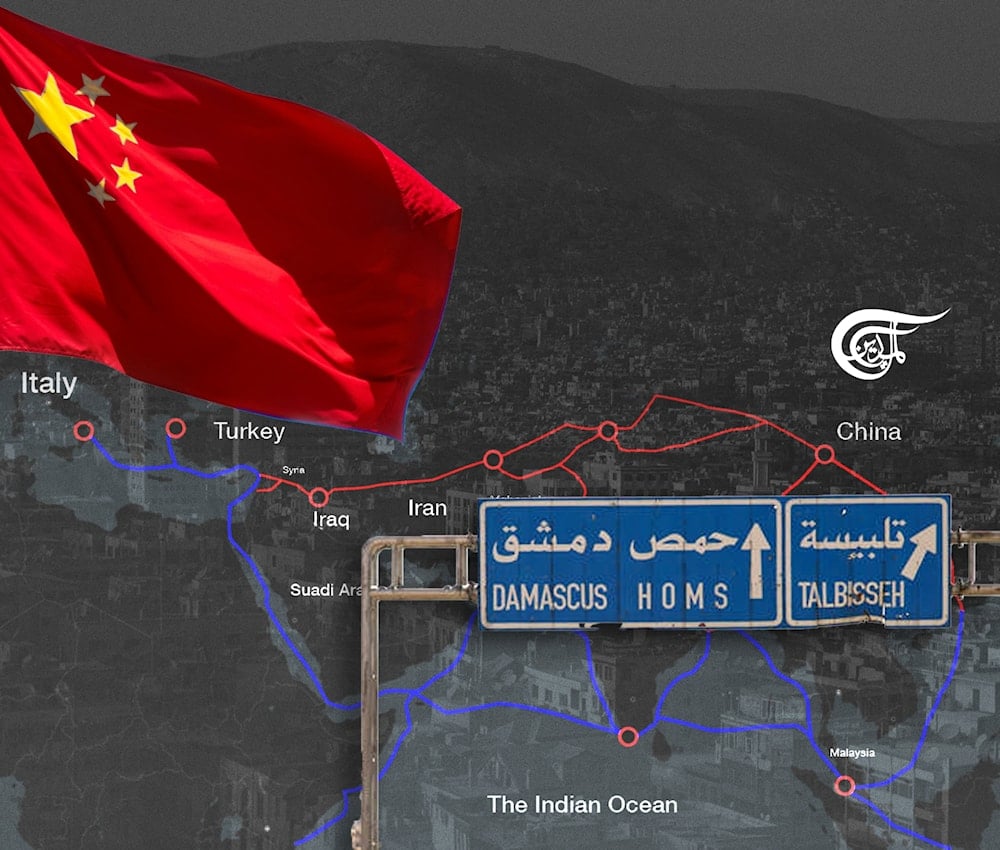China’s role in post-Assad Syria: Respecting the will of the Syrian people
As a major global power with a long-standing foreign policy principle of non-intervention, China’s response to the changes in Syria offers important insights into how Beijing views the future of the Syrian state.
-

China; an important player in Syria’s post-Assad future (Illustrated by Mahdi Rtail; Al Mayadeen English)
The fall of Bashar Al-Assad’s regime in December 2024 marks a historic turning point in Syria’s tortured 13-year civil war. As the long-standing rule of the al-Assad family comes to an end, the international community is left grappling with the question of what comes next for Syria—an important crossroads not just for Syrians, but for the broader Middle East and the world at large.
For many, this moment represents a chance for Syria to rebuild, to heal from the scars of conflict, and to create a government that reflects the will of its people. While the West, regional powers, and other actors in the Middle East will undoubtedly shape their policies around the evolving dynamics, one key player must be mindful of its role: China.
As a major global power with a long-standing foreign policy principle of non-intervention, China’s response to the changes in Syria offers important insights into how Beijing views the future of the Syrian state and its engagement with the region. In contrast to Western nations that have historically been involved in the Syrian conflict, either directly or through proxies, China’s stance will be based on its guiding foreign policy of respecting national sovereignty and allowing nations to determine their own paths without external interference.
Non-intervention: China’s core principle
China’s foreign policy has long emphasized respect for the sovereignty of other nations and a strong commitment to non-interference in internal affairs. This approach, enshrined in the “Five Principles of Peaceful Coexistence” established in the 1950s, has remained a cornerstone of Chinese diplomacy. It is, therefore, not surprising that China has refrained from direct involvement in Syria’s civil war, preferring to offer diplomatic support while maintaining a distance from the military confrontations that have consumed the region.
The fundamental belief that the people of Syria should have the primary agency in determining their future aligns with China’s broader worldview, where decisions about governance and leadership should be made domestically, not imposed externally. China’s diplomatic support for Syria has focused largely on defending the territorial integrity of the Syrian state, advocating for peace, and encouraging dialogue between all domestic parties. In this context, China’s approach to post-Assad Syria will likely be centered around respecting the Syrian people’s right to shape their future, without meddling in the nation’s political decisions.
China’s economic, strategic interests
While non-intervention will define China’s political stance, the economic stakes are also significant. Syria’s reconstruction after the war will require vast investments, and China stands to benefit by participating in this rebuilding process. As part of its Belt and Road Initiative (BRI), China has already increased its engagement with countries across the Middle East, and Syria presents an opportunity for Beijing to further cement its role as a key player in the region’s economic revitalization.
The scale of Syria’s reconstruction efforts will be immense, with major infrastructure projects, the revitalization of energy sectors, and the provision of humanitarian aid all requiring substantial investments. China’s vast resources, its experience in large-scale construction projects, and its willingness to engage in long-term partnerships make it a natural candidate to play a leading role in rebuilding Syria. However, this engagement will be rooted in a pragmatic respect for Syrian sovereignty. China will not impose a political solution or seek to influence the political makeup of the new government, but it will certainly play a critical role in shaping Syria’s economic future.
Challenge of political transition
As Syria embarks on a new chapter, the political transition will be crucial. This process will inevitably be challenging, given the complexities of the country’s diverse population, the existence of various armed factions, and the historical grievances that have led to years of conflict. The presence of Islamist, Kurdish, and Arab nationalist groups in Syria’s political landscape suggests that any new government will require significant negotiation and compromise.
For China, the path forward will be to engage with whatever government emerges from this transition, provided that it reflects the will of the Syrian people. Beijing will not impose its views on Syria’s internal political process, but it will encourage stability, dialogue, and unity among all factions, offering support for a future government that upholds Syria’s sovereignty and territorial integrity.
China’s position on Syria will also be influenced by its broader strategic objectives in the Middle East. China positions itself as a neutral partner for countries seeking economic development and geopolitical stability. The Chinese model of governance, which emphasizes economic pragmatism over ideological imposition, will appeal to many nations in the region, especially as they seek to rebuild after years of conflict.
A future of diplomacy, cooperation
China’s non-interventionist policy, combined with its economic resources and diplomatic influence, positions it as an important player in Syria’s post-Assad future. However, it is unlikely that Beijing will seek to shape Syria’s political future directly. Instead, China will continue to advocate for dialogue, reconstruction, and respect for Syria’s territorial integrity.
For Syrians, this may be a moment of newfound hope. As they rebuild their nation, they will have the opportunity to shape their future free from foreign domination. For China, the opportunity to contribute to Syria’s recovery—through investment, infrastructure development, and economic partnerships—represents both a moral commitment to its core foreign policy principles and a strategic interest in stabilizing a region that has long been a source of geopolitical volatility.
In the end, China’s approach to post-Assad Syria is a reflection of its broader foreign policy ethos—one that respects the right of nations to govern themselves and supports efforts to rebuild and recover. As Syria enters this new chapter, it will be up to the Syrian people to determine their future. China, for its part, will stand by their right to choose, offering its expertise and assistance in rebuilding the country while avoiding the pitfalls of interventionism. In doing so, it will demonstrate the relevance and wisdom of its longstanding commitment to non-interference and respect for sovereignty.

 Mohamad Zreik
Mohamad Zreik
 6 Min Read
6 Min Read











